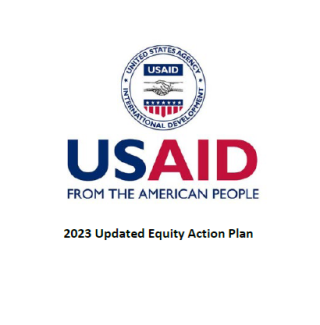USAID’s Equity Action Plan (EAP) guides USAID and its partners to democratize the development process by integrating equity into Agency policies, strategies, and practices; enhancing the ability of potential non-traditional partners to pursue USAID opportunities; preventing discrimination in Agency programs; and strengthening the Agency’s capacity to advance inclusive development in our overseas programming. Executive Order 14091 on Further Advancing Racial Equity and Support for Underserved Communities Through the Federal Government requires agencies to develop EAPs annually. The plan serves as the basis by which USAID measures its success for the diversity, equity, inclusion, and accessibility Agency Priority Goal in the Department of State and USAID Joint Strategic Plan FY 2022-2026.
USAID released its first Equity Action Plan in 2022. In 2024, USAID released its second Equity Action Plan, along with U.S. federal government organizations and agencies, to build on its strategy and progress.
The EAP has five strategies:
- Reduce barriers to the USAID partnership process through the WorkwithUSAID platform;
- Enhance accountability measures and nondiscrimination protections for program participants and employees of contractors and recipients;
- Reduce barriers for USAID awards including barriers in USAID’s acquisition and assistance processes that negatively affect partners’ ability to work with USAID;
- Advance effective and equitable U.S. foreign assistance that meaningfully integrates inclusive development and the perspectives and experiences of women and girls in all their diversity, and improve outcomes in gender equality and for marginalized populations; and
- Strengthen USAID's approaches to policy, programming, and learning to more effectively advance racial and ethnic equity and support for underserved communities in partner countries.
Highlighted Accomplishments
WorkwithUSAID.gov
- Since the launch of WorkwithUSAID.gov in November 2021, USAID has approved more than 5,700 partner profiles in the platform’s Partner Directory, and more than 4,232 have completed the pre-engagement assessment. This means that a greater number of new partners are prepared to apply to future opportunities.
- WorkwithUSAID.gov has more than 130 resources translated into multiple languages.
- In 2022, USAID had over 800 active partnerships with private sector companies. In the same year, USAID had overseas country offices, or Missions, in more than 80 countries, had activities in 158 countries, and funded over $38 billion in programming. A new Corporate Partnering Portal on the WorkwithUSAID.gov website enabled corporations interested in partnering with the Agency to learn more about upcoming opportunities.
Enhance accountability measures
- USAID developed the Social, Economic, and Environmental Accountability Mechanism (SEE-AM), which advances program participant protections. The mechanism provides a channel for program participants and affected communities to inform the Agency of harm experienced.
- USAID’s Office of Civil Rights established an External Civil Rights Division (ECRD) to oversee compliance with and enforcement of civil rights statutes in applicable programs and activities.
Reduce barriers for USAID awards
- Based on results from USAID’s FY23 Partnering Experience Survey, 44 percent of survey respondents believe that USAID’s partnering processes have become simpler, more efficient, and more effective over the past year.
- The Acquisition & Assistance Strategy launched in March 2023.
Advance effective and equitable U.S. foreign assistance
- USAID updated its Youth Policy and released the new Gender Equality and Women’s Empowerment Policy in March 2023. USAID released its new LGBTQI+ Inclusive Development Policy in August 2023 and Strategic Religious Engagement Policy in September 2023. In October 2023, USAID released its guidance on Inclusive Development (Additional Help for ADS 201 on Inclusive Development) and an Inclusive Development toolkit to assist in the integration of inclusive development approaches in program design.
Strengthen USAID's approaches to policy, programming, and learning
- In March 2023, USAID launched its Policy Framework: Driving Progress Beyond Programs that drives action to address them demands new, inclusive, and ambitious partnerships; investments in our people; and the streamlining of our processes.
Executive Order 14091
Executive Order 14091 on Further Advancing Racial Equity and Support for Underserved Communities Through the Federal Government builds upon previous equity-related Executive Orders by extending and strengthening equity-advancing requirements for agencies, and it positions agencies to deliver better outcomes for the American people.
It mandates the development of an Equity Action Plan (EAP) each year. The EAP shall include actions to advance equity, including under Executive Order 13985, Executive Order 13988 of January 20, 2021 (Preventing and Combating Discrimination on the Basis of Gender Identity or Sexual Orientation), Executive Order 14008, and Executive Order 14020.

